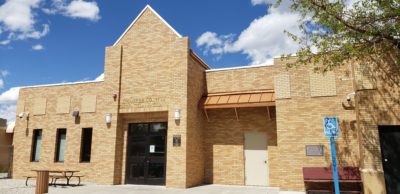The defense has rested and the prosecutors have said their piece. The jury in the sex assault trial of Herbert Lucas Scott has been given their instructions and they are in deliberation. Now the decision of guilt or innocence on the counts with which he is charged rests with the jury of his peers.
The Sequence of the Day, the CBI Interview and Testimony
Testimony continued on the third day of the sex assault trial of Herbert Lucas (H.L.) Scott. Colorado Bureau of Investigation (CBI) Field Agent Kevin Koback spoke on the witness stand for nearly three hours, during which an audio recording of a Dec. 30, 2020 interview he did with the victim was played for the jury. Present for the interview at her home was the victim, Chloe Kimmons, Agent Koback and a Detective Burgess.
In response to state’s attorney Dotter’s questions, Koback explained his approach to the questioning, verified information asked and answered on the audio and noted his observations of the victim’s mental state and body language during the session. During the interview Kimmons stated that “H.L. asked for sex two to three times a week and I refused.”
With Kimmons not present in the courtroom, Koback had asked on the audio if Kimmons was positive about her recollections and she said “yes”. He then asked if she was sure of the timeline, to which she replied she was sure about her birthday and her age then, but not about the other dates.

Chaffee County Detention Facility located adjacent to Chaffee County Courthouse on Crestone Avenue in Salida. Photo by Merrell Bergin
During the audio interview, Kimmons stated that on the date of the alleged assault, that Scott “forced me on the couch and raped me,” concluding that she wished to press charges against Scott.
Also on the day of the interview, Agent Koback contacted Kimmons mother, Sarah Bartha, who had not previously known of the alleged assault. Koback confirmed that Bartha had not spoken with her daughter about it, but Bartha confirmed the wrist injury sustained by Kimmons.
Koback also followed up by contacting witness Lily Spezze on the same day for corroboration. In cross-examination of Koback, Attorney Márquez questioned why the interview recording was audio-only and not a video. Koback responded that the CBI is not required to wear body cameras and that video equipment was not available on the interview date.
Direction then turned to cell phones and any data that might be present there. After Márquez consumed much time shuffling papers and going back and forth on this subject with the opposition, Judge Murphy ruled that the jury was to totally disregard any of the questions and answers they had heard surrounding this topic.
The People Rest
At 2:51 p.m. the prosecution rested their case and the jury was excused for a break. Márquez then moved to acquit on the third count, to which the state’s attorneys agreed and that count was dismissed. Márquez then stated that the defendant, H.L. Scott had made the sole choice to testify on his own behalf, having been advised by Judge Murphy that Scott would be subject to cross-examination.
Defendant Testifies
When the jury returned at 3:15 p.m. Attorney Márquez walked Scott and the jury through a lengthy timeline of events, starting from the defendants’ high school days, through the on-and-off “dating” history, leading up to the alleged incidents. Scott stated that “I like to be forward and honest with people and wanted her to know I wanted a sexual relationship.” He later said “I tried to test her boundaries, but respected them,” though he stated that his messages were more aggressive after his return in the spring of 2019 from a six-month visit to a kibbutz in Israel.
At this point, Márquez led Scott (again) through a recap of the previously cited, highly graphic, Snapchat and Facebook Messenger exchanges between Scott and Kimmons. Márquez then reiterated his earlier assertions that the relationship included bilateral “negotiations” of sexual favors in return for money and gifts of clothing. It should be noted that evidence of, and the relevance of any mutually completed transactions of this nature remain to be considered by the jury after closing arguments and during their deliberations.
Trial Moves to Closing Arguments
At the end of the third day, prosecutors completed their closing statements, telling the jury: “Mr. Scott would like you to find that he was simply “courting”, that his texts were appropriate. Those texts were not courting – they were grooming…which is creating emotional boundaries to desensitize people.”
Attorney Dotter reminded the jury of Scott’s confirmation of these texts, (which he described as “compliments”):
“She kept putting up barriers that I just had to get over.”
“She agreed to be purchased.”
“She wasn’t going to get those items unless I finished.”
“He was gauging how she would react to more and more subtle exposure. He got the same response, but he still didn’t stop,” Dotter concluded. “Hold him accountable.”






Recent Comments